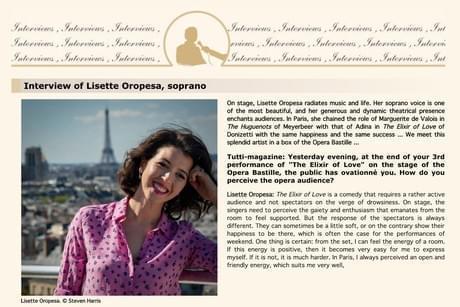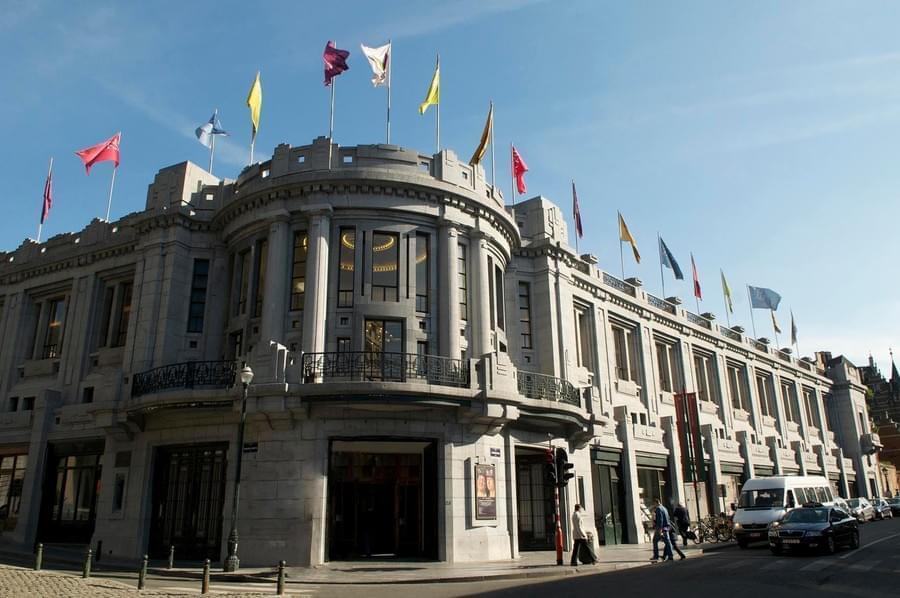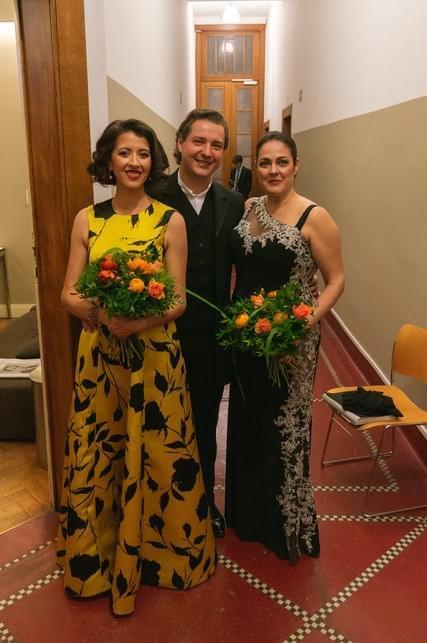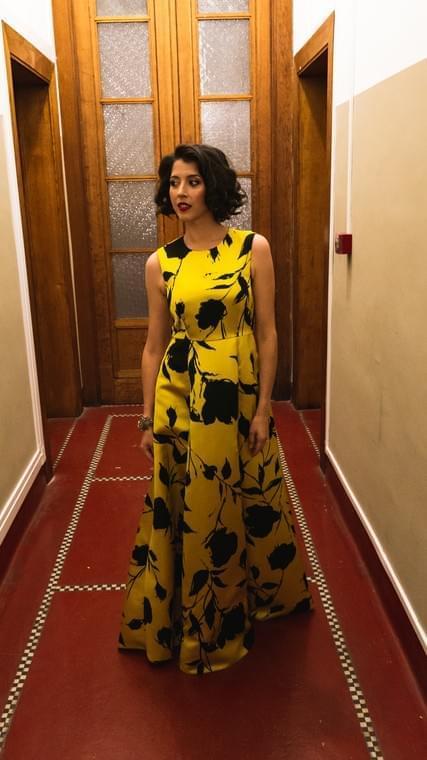Cast
| Robert | Dmitry Korchak | |
| Bertram | Nicolas Courjal | |
| Raimbaut | Julien Dran | |
| Alberti | Patrick Bolleire | |
| Prêtre | Patrick Bolleire | |
| Isabelle | Lisette Oropesa | |
| Alice | Yolanda Auyanet | |
| Héraut | Pierre Derhet |
Evelino Pidò
ChorusmasterMartino Faggiani
About
Robert le Diable, the first opera in French by Giacomo Meyerbeer, was inspired by the medieval legend of the Norman duke Robert, with at its heart the eternal struggle between good and evil. With its supernatural subject matter, the libretto by Scribe and Delavigne brings together many of the themes that were so characteristic of the spirit of the Romantic era. The long-awaited opening night in 1831 was an unparalleled triumph. Balzac described Meyerbeer’s operas as ‘the temple of illusion and miracles’, an apt description of this grand opera à la française, which demanded all the resources of the stage on a grand scale. The orchestral score, full of powerful contrasts and impressive choral passages, is in good hands with the conductor Evelino Pidò, making a contribution to the Meyerbeer revival of the last decade. With Robert le Diable and Frankenstein on the bill at La Monnaie, supernatural phenomena and fantastic creatures will be to the fore this spring.
This production will be broadcast on Klara on May 4th 2019.
Media
Lisette Oropesa discusses Robert le Diable.
Robert le diable - Robert, toi que j’aime - Lisette Oropesa

2019 - Spring Newsletter
La Scala, La Monnaie, Pittsburgh Opera

Tutti Magazine - Interview
Lisette Oropesa interviewed in Tutti Magazine

❄️ Winter Newsletter - Rodelinda, Robert le Diable
❄️ Winter Newsletter - Rodelinda, Robert le Diable
Reviews
Robert le diable in het PSK
De ontegensprekelijke ster van de avond was de Isabelle van Lisette Oropesa. Ik heb haar al een paar keer in cinemavoorstellingen gehoord, meest recent als Marguerite vanuit Parijs, maar dit was mijn eerste live ervaring. De cinema-versie van Oropesa is maar een schaduw van hoe ze in het echt klinkt. Meteen met haar openingsaria "En vain j'espère" zit haar stem juist. Ze zingt met een pakkende frasering, haar hoge noten klinken fantastisch met daarenboven mogelijkheid tot dynamiek van piano tot forte, coloraturen hebben diepgang en met dat alles kan ze nog eens ontroeren ook. Haar paradestuk komt in het vierde bedrijf met de cavatina "Robert, toi que j'aime". Dat zou een saaie aria kunnen worden met een paar honderd herhalingen van "grâce pour toi", maar bij Oropesa blijf je luisteren naar alle smekende nuances die ze weet op te roepen, maar telkens met een ondertoon van het hartzeer dat ze voelt. Het einde van de aria geeft ze een voorwaartse stuwing mee die onvermijdelijk leidt tot een minutenlange ovatie.The undisputed star of the evening was Isabelle by Lisette Oropesa. I've heard her a few times in cinema performances, most recently as Marguerite from Paris, but this was my first live experience. The cinema-version of Oropesa is but a shadow of how she sounds in real life. Immediately with her opening aria "En vain j'espère" her voice is on point. She sings with a captivating phrasing, her high notes sound fantastic with the added possibility of dynamics from piano to forte, her coloraturas have depth, and on top of all this, she can also move the audience. Her showpiece comes in the fourth act with the cavatina "Robert, toi que j'aime". This could become a boring aria with a few hundred repetitions of "grâce pour toi", but with Oropesa you keep listening to all the pleading nuances she knows how to evoke, but always with an undertone of the heartache she feels. The end of the aria she propels forward leading inevitably to a minutes-long ovation.— Inquisitor • Il Grand' Inquisitor
Oropesa steelt de show in Robert le Diable
Alles wat deze Cubaans-Amerikaanse sopraan aanraakt, verandert in goud. In Amsterdam hoorde we haar eerder als een fenomenale Nannetta in Falstaff (De Nationale Opera) en Gilda in Rigoletto (De Nationale Opera en de NTR ZaterdagMatinee). Haar krachtige lyrische sopraan klonk als een warm bad. Oropesa’s eerste aria werd onthaald met langdurig applaus. Haar tweede aria, ‘Robert, toi que j’aime’ in de vierde akte, was een showstopper pur sang. Wat een prachtaria, en wat een prachtsopraan. Trillers, coloraturen, legatolijnen, dictie: alles klopt bij Oropesa. Hopelijk houdt ze het hoofd koel en weet ze zich te hoeden voor rollen die ze wijselijk moet afhouden. Dit is een stem die niet vaak voorkomt heden ten dage.Everything this Cuban-American soprano touches turns to gold. In Amsterdam, we've previously heard her as a phenomenal Nannetta in Falstaff (The National Opera) and Gilda in Rigoletto (The National Opera and the NTR Saturday Matinee). Her powerful lyrical soprano sounded like a warm bath. Oropesa's first aria was greeted with prolonged applause. Her second aria, 'Robert, toi que j'aime' in the fourth act, was a showstopper par excellence. What a gorgeous aria, and what a magnificent soprano. Trills, coloraturas, legato lines, diction: everything is perfect with Oropesa. Hopefully, she keeps her cool and knows to avoid roles she should wisely refrain from. This is a voice that is not common nowadays.— Lennaert van Anken • Place de l'Opera
A Bruxelles, la beauté du Diable de Meyerbeer
Après sa triomphale prise de rôle en Elisabeth de Valois à l’Opera de Paris, Lisette Oropesa faisait ses débuts à Bruxelles dans un autre rôle de Meyerbeer, la princesse Isabelle, dont elle avait déjà brillamment interprété en récital le grand air « Robert, toi que j’aime ». Une nouvelle fois, la soprano américaine maitrise sans aucun effort apparent les difficultés de la partition, tant dans ses airs et leurs cabalettes que dans les duos et autres redoutables finales d’acte. Toujours très expressive et en interaction avec ses partenaires et le chœur, elle réussit même, malgré la version de concert et grâce à un français remarquable, une belle caractérisation du personnage. L’air du 4ème acte est un concentré de toutes ses qualités : émotion, longueur de souffle, légato parfait, aisance dans les coloratures et magnifiques nuances y compris dans le suraigu. Elle y obtient une longue et légitime ovation du public bruxellois conquis.After her triumphant debut as Elisabeth de Valois at the Paris Opera, Lisette Oropesa made her Brussels debut in another Meyerbeer role, Princess Isabelle, whom she had already brilliantly performed in recital the grand aria “Robert, toi que j'aime.” Once again, the American soprano effortlessly mastered the difficulties of the score, both in her arias and their cabalettas as well as in duets and other formidable act finales. Always very expressive and interacting with her colleagues and the choir, she even managed, despite the concert version and thanks to her remarkable French, a beautiful characterization of the character. The aria from the 4th act showcases all of her qualities: emotion, breath control, perfect legato, ease in coloratura, and magnificent nuances including in the high register. She received a long and well-deserved ovation from the conquered Brussels audience.— Denis Peyrat • Toute la culture
Meyerbeer, prophète au plat pays
Aucune réserve en ce qui concerne l’Isabelle de Lisette Oropesa. Dans la droite ligne de sa Marguerite de Valois à Bastille en octobre, elle continue de stupéfier, et le public bruxellois lui a réservé un triomphe. Ce qu’on entend sortir de sa gorge tient du miracle. Une voix belle, incroyablement belle, une technique souveraine, une égalité jamais prise en défaut quels que soient les redoutables intervalles imposés par Meyerbeer, des réserves de puissance qui paraissent inépuisables, un français qu’on dirait appris à la naissance. De quoi perdre la tête.No reservations whatsoever regarding Lisette Oropesa's Isabella. Following in the footsteps of her Marguerite de Valois in Bastille last October, she continues to astonish, and the Brussels audience gave her a triumphant reception. What emerges from her throat seems like a miracle. A voice that is beautiful, incredibly beautiful, with supreme technique, a consistency that is never compromised no matter the daunting intervals imposed by Meyerbeer, reserves of power that seem inexhaustible, and French pronunciation that you would think she learned at birth. It's mind-blowing.— Dominique Joucken • Forum Opera
Robert le Diable de Meyerbeer ressuscité au Palais des Beaux-Arts de Bruxelles
Etourdissante Marguerite de Valois dans la production des Huguenots précitée, la soprano étasunienne Lisette Oropesa (Isabelle) enthousiasme à nouveau grâce à sa miraculeuse technique et son grain de voix d’une séduction renversante. Au brio de sa première scène « En vain j’espère » suivie d’une cabalette ornée d’un goût très sûr, elle oppose l’intensité et la grâce, l’émotion de l’accent et la beauté de la ligne dans l’air « Robert, toi que j’aime ».In the aforementioned production of Les Huguenots, the staggering Marguerite de Valois, American soprano Lisette Oropesa (as Isabelle), once again excites with her miraculous technique and the allure of her captivating voice. To the brilliance of her first scene “En vain j’espère,” followed by a cabaletta adorned with exquisite taste, she contrasts the intensity and grace, the emotion of the accent, and the beauty of the line in the aria “Robert, toi que j’aime.”— Emmanuel Andrieu • Opera Online
ROBERT LE DIABLE À BRUXELLES : UN RYTHME INFERNAL
En premier lieu, la reine de la soirée, Lisette Oropesa dans le rôle d’Isabelle ; elle y développe toute la suprématie vocale qu’elle possède sans faille, étant à l’apogée de ses moyens : sons filés, aigu victorieux, colorature mathématique, tout y est absolument à sa place. De plus, sa qualité suprême est de parvenir à créer des lignes superbes dans le phrasé, créant de réelles tensions dramatiques à des moments plus faibles de l’ouvrage. L’équilibre était difficile à obtenir avec le second rôle féminin, qui est finalement celui qui a bénéficié des nombreuses innovations musicales de Meyerbeer à l’époque de l’écriture de l’œuvre : trios a capella, tessiture hybride, urgence dans l’action.Firstly, the queen of the evening, Lisette Oropesa in the role of Isabelle; she fully showcases her flawless vocal supremacy, being at the peak of her abilities: thread-like notes, victorious highs, mathematical coloratura, everything is absolutely in its place. Moreover, her supreme quality is her ability to create stunning lines in her phrasing, creating real dramatic tension in weaker moments of the work. The balance was difficult to achieve with the second female role, who is actually the one who benefited from many of Meyerbeer's musical innovations at the time of the work's composition: a cappella trios, hybrid vocal ranges, urgency in the action.— Alain Attyasse • ResMusica





